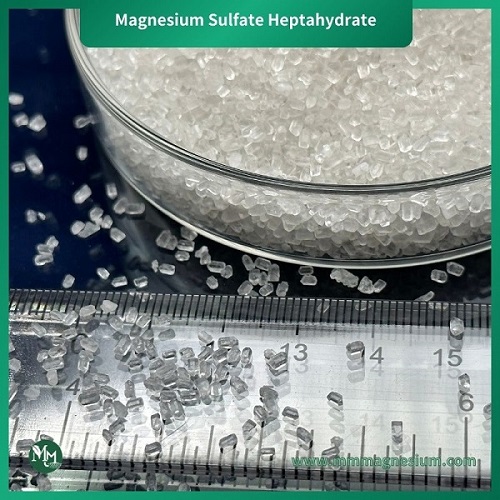

In aquaculture, magnesium sulfate heptahydrate (MgSO₄·7H₂O) is mainly used because it has good water solubility and stability, and is easy to disperse evenly and dissolve quickly in water, so that it can be more effectively absorbed and utilized by aquatic organisms. Magnesium ions (Mg²⁺) in magnesium sulfate are trace elements necessary for the growth and metabolism of aquatic organisms, while the presence of sulfate ions (SO₄²⁻) in water helps maintain the stability of water quality.
Specific applications of magnesium sulfate in aquaculture:
1. Regulating water quality
One of the main applications of magnesium sulfate in aquaculture is to regulate water quality. Magnesium ions have a buffering effect in water, which can neutralize acidic substances in water and stabilize pH. A stable pH value is essential for the growth environment of aquatic organisms, especially for fish and crustaceans. The appropriate pH range helps reduce stress responses and the occurrence of diseases.
2. Nutritional supplementation
Magnesium is a cofactor of enzymes in many aquatic organisms and participates in a variety of physiological and biochemical processes. For example, magnesium plays an important role in photosynthesis, protein synthesis and energy metabolism. By adding magnesium sulfate, the magnesium required by aquatic organisms can be effectively supplemented to promote their healthy growth.
3. Promote plant growth
Aquatic plants such as water grasses and algae also need magnesium for growth. Magnesium sulfate can improve the photosynthesis efficiency of these plants, thereby increasing the dissolved oxygen content of the water body and improving the overall water quality environment. This is of great significance to the ecological balance of the breeding environment.
Many studies have confirmed the effectiveness of magnesium sulfate in aquaculture. For example, a study on tilapia (Oreochromis niloticus) found that the appropriate addition of magnesium sulfate can significantly increase the magnesium content and growth rate of fish. In addition, the study also showed that magnesium sulfate helps to improve the stress resistance and immune response of fish and reduce the incidence of diseases. Adding an appropriate amount of magnesium sulfate to the feed of white shrimp (Litopenaeus vannamei) can not only increase the growth rate of shrimp, but also improve its cold resistance and salt tolerance, and enhance its adaptability in different environments.
Although magnesium sulfate has many advantages in aquaculture, the following points should still be noted in actual use:
1. Appropriate addition
The amount of magnesium sulfate added should be determined according to the specific water quality conditions and the needs of the cultured organisms. Excessive use may cause excessive salinity in the water body and affect the normal growth of the organisms.
2. Regular monitoring
After adding magnesium sulfate, water quality parameters, including pH value, salinity and magnesium ion concentration, should be monitored regularly to ensure that the water quality is within the appropriate range.
3. Cooperate with comprehensive management
The use of magnesium sulfate should be combined with other water quality management measures, such as regular water changes, reasonable feeding and disease prevention, to achieve the best results.
Yingkou Maomei Agricultural Technology Co., Ltd
Name: Brenda
Mobile:86-188-7490-2028
Tel:86-400-699-8826
Whatsapp:86-18874902028
Email:info@maomeimg.com
Add:Qianjia Village, Nanlou Economic Development Zone, Yingkou City, Liaoning Province, China